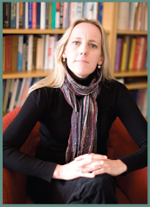Editor’s Note
 “WE ARE NOT AT WAR with men,” writes the new co-chair of the American Humanist Association’s Feminist Caucus, Zelda Gatuskin. “We are at war with history—a history defined by a patriarchy so tenacious and entrenched it feels almost dangerous to say the word aloud.” True that. And yes, with increasing restrictions on women’s reproductive freedom, rising poverty, and the deteriorating myth of “having it all,” it does sometimes feel as if women are being sucked back, or are somehow stuck, in time.
“WE ARE NOT AT WAR with men,” writes the new co-chair of the American Humanist Association’s Feminist Caucus, Zelda Gatuskin. “We are at war with history—a history defined by a patriarchy so tenacious and entrenched it feels almost dangerous to say the word aloud.” True that. And yes, with increasing restrictions on women’s reproductive freedom, rising poverty, and the deteriorating myth of “having it all,” it does sometimes feel as if women are being sucked back, or are somehow stuck, in time.
There was a time, not long ago, when people wondered why a liberal group like the AHA needed a feminist caucus at all. Wasn’t the entire organization inherently feminist in its outlook and its goals? humanists asked. But as Cleo Fellers Kocol states in her brief “herstory” of the Feminist Caucus, we need it now more than ever, primarily because American women in general haven’t achieved equality, and because secular women still haven’t leveled the playing field of their own movement.
Young secular women seem to be the most misunderstood. On the one hand, they’re apparently way into sex and black clothing. (In a radio interview with a Secular Student Alliance member from the University of Nebraska-Omaha, conservative radio host Scott Voorhees opined: “You know why the Christian kids helped you out in your debate? Because atheist chicks are easy. And a lot of them are goth and hot.”) On the other hand, young female skeptics are dubbed prudes or feminazis for complaining about sexism and about unwanted, sometimes creepy sexual attention from folks at secular gatherings. (For the record, I think nice invitations are nice and pestering is pathetic.)
Meanwhile, an article in the July/August Atlantic by Anne-Marie Slaughter, a Princeton professor and former high-ranking State Department policy advisor, went viral as readers weighed in on whether “having it all” (in terms of family and a fulfilling career) has set the bar impossibly high or whether women can and should work as hard as they can to clear it. “Women of my generation have clung to the feminist credo we were raised with,” Slaughter wrote, “because we are determined not to drop the flag for the next generation. But when many members of the younger generation have stopped listening, on the grounds that glibly repeating ‘you can have it all’ is simply airbrushing reality, it is time to talk.”
On top of that, the novel Fifty Shades of Grey has become the fastest selling paperback of all time. Classified as “mommy porn” for its popularity among middle-aged and older women (although those in their 20s and 30s are also big fans) it’s widely considered a poorly written romance novel in which the heroine agrees to be the submissive in a sadomasochistic relationship and loves it. Readers report a sense of liberation in their enjoyment of the book.
No wonder no one seems to know what feminism means anymore! If you’re curious about what it means to humanists, we give you… our feminissue. From the recent implementation of sexual harassment policies at secular conferences to the new abstinence pushers, from the intersection of feminism and racism, to the history of women in the secular movement, I’m thrilled with the stellar lineup of women herein (surely featuring more female writers, designers, illustrators, and organizers than any single issue of this magazine ever has before), all anchored by the amazing Gloria Steinem. The chance to sit down with her was a career highlight for me, and as you read that interview, I’m sure you’ll agree she’s still got it: the wisdom, the humor, the warmth, and the bite. And for male readers who think this issue isn’t for them: think again. Because it isn’t for man-haters. It isn’t about man-haters. It’s about women-lovers. And it’s where the women-lovers are at.
Jennifer Bardi is the editor of the Humanist.
